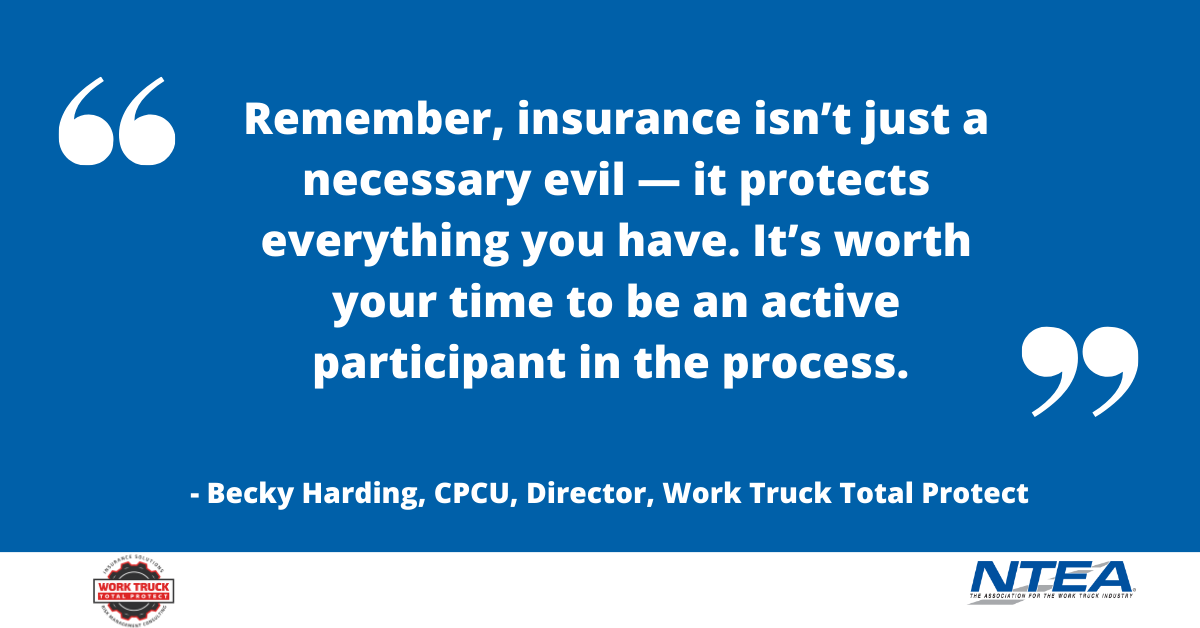
Guest editorial
By Becky Harding, Director, Work Truck Total Protect
This article was published in the October 2018 edition of NTEA News.
As an insurance agent, I’m acutely aware of how people feel when it’s policy renewal time. But I challenge you to rethink — and even welcome — it. Remember, insurance isn’t just a necessary evil — it protects everything you have. It’s worth your time to be an active participant in the process. Besides, there are benefits to a thorough renewal review process with your insurance professional.
Saving money
There are many ways to save money through the renewal review process. Often, when operations are not reviewed for several years, you may find coverages you no longer need or operations that have been discontinued. For instance, if an upfitter no longer maintains a dealers’ license, vehicle inventory and dealers’ liability coverages aren’t needed anymore. Another example would be safety changes resulting in more attractive property premiums (new alarm or sprinkler systems or replacement of an older electrical system). These are all items your agent would discover and could bring to the underwriter’s attention at renewal for possible savings.
Filling coverage gaps
This can be as simple as discovering a new vehicle was purchased during the year and the agent wasn’t informed. Or it can be as complicated as finding out your board of directors is making important decisions on behalf of your company and you don’t have Directors & Officers (D&O) Liability insurance. In the former example, an uninsured accident can be devastating to a small business. Depending on how your policy is written, an unlisted vehicle may not be covered. This is the type of information you can discover during the renewal review. In the latter example, you likely aren’t even aware of an exposure for D&O Liability. However, D&O losses can be the largest of litigated claims, ranging from $150,000 to more than $1,000,000.
Understanding how your insurance dollars are spent
The better you understand from where your premium is derived, the more accurately you can control that cost. For example, if your General Liability policy has several classifications describing your various operations (upfitting, repair, parts sales, etc.) and each is assigned a rate per $1,000 of estimated sales, you and your agent can appropriately classify revenues. By not doing so, underwriters will generally lump all sales into one classification. Thoroughly reviewing your operations and listing them accurately for the underwriter can save angst at an audit and potentially keep you from being double-charged.
Identifying overlooked exposures (risk assessment)
Pinpointing these items can come in many forms — from an insurance company inspection to an old-fashioned conversation with your agent. The insurance inspection is detailed and can help identify things in your operation that could lead to a claim. Additionally, the insurance company may have recommendations that are easily implemented, such as servicing fire extinguishers, fixing a malfunctioning eye-wash station or clearly marking areas of the shop where the public is prohibited. While these seem like small things, they can all lead to hefty losses, and taking care of them is less of a headache than the alternative.
A conversation with your agent about current and discontinued operations, and future plans is paramount. Your insurance professional may have suggestions not previously considered. For instance, what if you’re sued by an employee for discrimination, and your agent says there is an insurance to cover it, but you don’t have it? That is precisely the reason for the risk assessment.
Although policy renewal may not be something you look forward to, use it as an opportunity to understand what you are and aren’t insuring, what your true exposures are and how you can participate in managing those risks.
The renewal review is ultimately for you — it’s your policy, your premium dollars and, most importantly, your livelihood being protected.
As NTEA’s preferred insurance agency, JD Fulwiler & Co Insurance developed the Work Truck Total Protect program to provide the industry with underwriting, risk assessment and loss prevention services. JD Fulwiler will shop among many top insurance carriers with which it does business to find a coverage solution that best meets your needs. Learn more about this program at ntea.com/partnerships or call 800-441-6832.